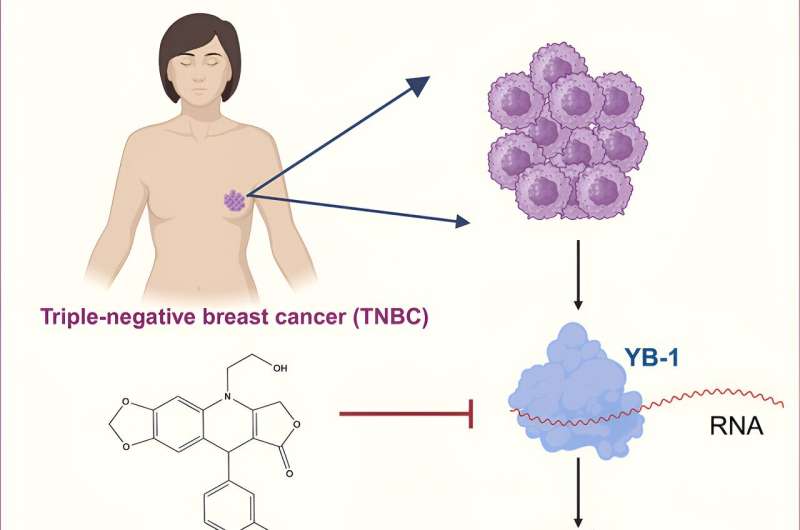This article has been reviewed according to Science X's editorial process and policies. Editors have highlighted the following attributes while ensuring the content's credibility:
fact-checked
peer-reviewed publication
trusted source
proofread
Cancer drug shows powerful anti-tumor activity in animal models of several different tumor types

Behind the scenes, as tumors progress and gain resistance to treatment, a protein called YB-1 quietly gives directions. Now, researchers at Oregon Health & Science University have developed a first-of-its-kind drug that inhibits YB-1, effectively silencing those orders.
The drug has shown powerful anti-tumor activity in animal models of several different tumor types, including ovarian cancer and an aggressive form of breast cancer.
"YB-1 is an important signaling point in many different cancers, and it contributes to drug resistance in these cancers," said Sanjay Malhotra, Ph.D., a professor of cell, developmental and cancer biology in the OHSU School of Medicine. "Until now, there was no drug targeting YB-1."
The compound, called SU056, is headed toward clinical development by an OHSU startup company.
It is a prime example of the mission of the Center for Experimental Therapeutics at the OHSU Knight Cancer Institute. "The center was set up to bring discoveries from the lab to the clinic," said Shivaani Kummar, M.D., co-director of the center.
Scientists from more than 25 laboratories at OHSU are working in collaboration with the center to translate their findings into new treatments for patients. About two-thirds of projects are focused on cancer, but the center also works on neurodegenerative, cardiovascular, metabolic and infectious disease therapies.
The center's repertoire includes access to chemical compounds, high-throughput screening services, and a wide range of model systems. The center also provides access to pharmacology, toxicology and chemistry expertise.
"We have the capability for pre-clinical development of compounds to make them more effective and less toxic," Malhotra said. "This enables prioritizing these for further clinical development."
Targeting YB-1
Discovery of the YB-1 inhibitor took a zig-zagging path. Malhotra and colleagues began pursuing a different target implicated in drug-resistant ovarian cancers. They designed a compound to inhibit that target and took it through three rounds of chemical modifications. The third-generation compound showed striking anti-cancer activity, but experiments revealed that it seemed to be missing the intended target and was instead interfering with YB-1.
"And that opened up the whole new field," Malhotra said. "We started diving deeper into the mechanism of this specific protein."
YB-1 is an important regulator of the translation of genetic messages into the synthesis of proteins. It appears to play a role in cancer progression and drug resistance in at least 21 types of cancer.
In a recent paper in the journal Cell Reports Medicine, Malhotra and co-authors detail how SU056 acts against triple-negative breast cancer, an aggressive subtype that accounts for about one-fifth of breast cancer cases.
In multiple cell lines modeling triple-negative breast cancer, SU056 inhibited growth and cell cycle progression, meaning cancer cells couldn't replicate as easily.
In patient-derived xenograft models of triple-negative breast cancer—using samples that came from donors—doses of the drug given orally over 21 days inhibited tumor growth by up to 63%. In a model of tumor spreading, the SU056-treated group of animals had a 65.5% decrease in lung metastasis compared with the control group.
Toxicological studies showed that SU056 is well-tolerated without adverse effects. Animal models given oral doses up to 20 times the therapeutic level were monitored for behavioral, neurologic and anatomical signs of toxicity and morbidity, and the researchers said they found no observable changes in any of the measures.
The researchers also revealed insights into the way their SU056 compound works. To resist anti-cancer therapies, tumors have to boost their capacity for protein synthesis. Experiments by Malhotra's team showed that SU056's effects are the result of disrupting protein translation machinery.
Findings suggest that SU056 interacts with YB-1 at a location that stops it from binding mRNA, the messenger molecules of genes, and also inhibits the interaction between YB-1 and protein synthesis machinery, in turn suppressing translation.
Now Malhotra's team is planning the enabling studies on the drug's toxicology and pharmacology to pave the way for a phase 1 clinical trial involving people with cancer.
More information: Arpit Dheeraj et al, Inhibition of protein translational machinery in triple-negative breast cancer as a promising therapeutic strategy, Cell Reports Medicine (2024). DOI: 10.1016/j.xcrm.2024.101552



















